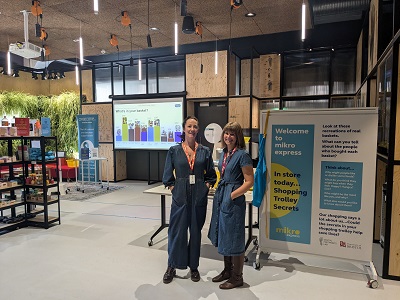
December 11, 2024, by aczht
What we learned from the public about shopping data and health
This blog highlights the transformative research by Dr Elizabeth Dolan, Research Fellow in Health Data Science at the N/Lab at the University of Nottingham. Elizabeth explores how everyday purchases could help detect health issues, from tracking respiratory illness trends with the NHS to identifying early signs of ovarian cancer.
Here’s a look at how her work is bridging the gap between data-driven innovation and the communities it serves and how insights from public engagement are shaping the future of healthcare.
How shopping data could revolutionise healthcare by Dr Elizabeth Dolan
When I began my PhD, Diagnosing Disease with Shopping Data at N/Lab and Horizon CDT, I never imagined how much it would evolve through conversations with the public. Over the past five years and into my fellowship, I’ve worked on projects exploring how everyday purchases could help detect health issues—starting with respiratory illnesses in collaboration with the NHS, and also with Ovacome and CLOCS (Cancer Loyalty Card Study) to address ovarian cancer.
These conditions may seem worlds apart, but shopping data holds potential in both. For respiratory illnesses, it could track over-the-counter medication sales to predict spikes in cases. For ovarian cancer, it could spot early warning signs based on symptom-related purchases like indigestion remedies or supplements for fatigue. But for this kind of research to have real-world impact, we need the public to trust it—and that’s where our engagement activities are crucial.
A weekend of listening at We The Curious
One recent event took place in October 2024 at We The Curious (WTC) in Bristol. It marked the culmination of a series of public engagement activities, including a film, How Your Shopping Could Save Lives, and an interactive webinar. This final event gave us the chance to meet people face-to-face, supported by the brilliant team from Ovacome, who brought their expertise in ovarian cancer.
At WTC, visitors could view my PhD Partners’, the University of Bristol, Shopping Secrets exhibit:
- Select items in a simulated shop, scan their “shopping baskets,” and reflect on whether they’d share their data.
- Compare their habits using pre-filled shopping baskets and tokens to spark conversations.
- Share their thoughts on postcards or by building paper chains representing organisations they trusted with their data.
But the heart of the weekend was the one-on-one discussions with real people. These personal conversations brought the research to life, helping us understand not just people’s views, but their stories and concerns.
What people told us
- Support for data sharing (with reservations):
Many attendees were open to sharing their shopping data for health research, provided it was anonymised and securely handled. However, privacy concerns and skepticism about commercial use remain common themes that need continued careful consideration. - Women’s health resonated:
Women really valued the focus on ovarian cancer and women’s health in general, sharing personal stories about struggling to get GP appointments or feeling their health concerns weren’t taken seriously. They emphasised the importance of research addressing unmet needs like perimenopause and urinary tract infections (UTIs). - Ethics and transparency matter:
There was a clear need for better communication about how data is used and by whom. Some attendees expressed confusion about how data sharing works in the NHS, something I hadn’t encountered before. I wondered if this was linked to the introduction of the NHS app, which gives access to personal health records but raises questions about data sharing. - Parents wanted tools for nutrition:
Parents appreciated the link between shopping habits and children’s health but acknowledged the challenge of translating awareness into action—especially as children eagerly filled their pretend baskets with sugary treats during the event. - A smarter app for Data Donation:
Many participants suggested an app that wouldn’t just collect and share shopping data but also analyse it for users. They envisioned an app that could assess how healthy they were, offering personalised insights and suggestions.
What’s Next?
This feedback is shaping my research in real time. Insights from these events are already informing future projects, such as using shopping data to detect early signs of lung cancer and refining study designs for research into women’s urogenital health through self-medication sales. They’ve also guided funding proposals, including those to UKRI and the Wellcome Trust.
Above all, these conversations reminded me that the public’s voice is absolutely essential in health research—not just to build trust, but to ensure we’re asking the right questions and solving the right problems.
For further research information or to connect with me, feel free to reach out via elizabeth.dolan@nottingham.ac.uk or visit www.nlab.org
Watch the film on YouTube here: Open City Research: How your shopping could save lives? – We The Curious
Further reading:
Links to partner organisation’s websites:
Digital Footprints Lab – University of Bristol
CLOCS – Cancer Loyalty Card Study
Key research:
Dolan, E., Goulding, J., Marshall, H. et al. Assessing the value of integrating national longitudinal shopping data into respiratory disease forecasting models. Nature Communications 14, 7258 (2023).
Dolan EH, Goulding J, Tata LJ, Lang AR. Using Shopping Data to Improve the Diagnosis of Ovarian Cancer: Computational Analysis of a Web-Based Survey. JMIR Cancer. 2023 Mar 31;9:e37141.
Dolan, E.H., Shiells, K., Goulding, J. et al. Public attitudes towards sharing loyalty card data for academic health research: a qualitative study. BMC Med Ethics 23, 58 (2022).
No comments yet, fill out a comment to be the first

Leave a Reply